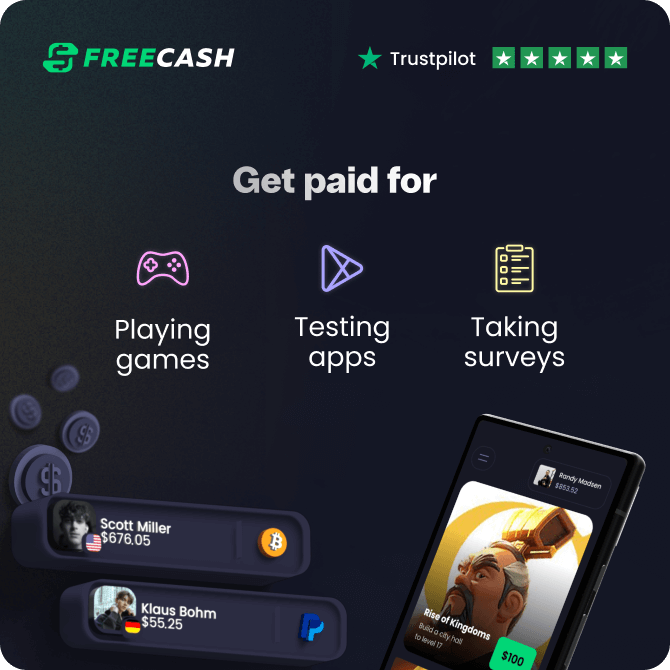The thought of identity theft is enough to make anyone anxious. But knowledge is power.
If you’re searching for ways to earn money online, especially with tempting apps promising quick cash, it’s crucial to recognize the risks.
These platforms can be havens for scammers looking to exploit your personal information.
Understanding how identity theft happens, its devastating consequences, and, most importantly, how to protect yourself is essential.
While you can’t completely eliminate the threat, taking proactive steps puts you back in control.
This includes being cautious about the apps you install, carefully reviewing their privacy policies, and fiercely protecting your data.
Identity theft can cause financial ruin, damage your credit, and leave you feeling violated.
But you can reduce the chances of becoming a victim by taking action now.
This post will explore the dangers and empower you to safeguard your identity.

The Allure of Quick Cash Apps
The promise of easy, fast money can be irresistible in a world focused on instant gratification!
Apps promising cash rewards for simple tasks like watching videos, playing games, or taking surveys tap into our desire for financial freedom.
Unfortunately, many of these apps exploit your need for instant money. But they put your identity at serious risk.
Let’s take a closer look at one of the most popular scams: fake cash games.
These casual games are simple and addictive. You play and earn points or cash that you can later exchange for real money.
In the meantime, you’re bombarded with ads. It’s the developers, not you, raking in the cash.
The catch? You must reach a specific payout threshold before withdrawing your “winnings.”
Here’s the true danger: When you hit that threshold, the app asks you to select a payment method and enter your payment information, such as your bank account details, PayPal address, or other sensitive financial data.
Many users unknowingly hand over the keys to their financial kingdom, giving scammers everything they need to commit fraud and identity theft.
It’s not just about the payment information. These apps often trick you into consenting to share data or give access to your files.
You may expose sensitive information such as your contacts, photos, and location data by granting these permissions.
So, scammers can use your data to create a more comprehensive profile of your identity.

This reward platform is going viral! Cash out via PayPal, Visa, Gift Cards, and in-game currencies - Click here to find out how to generate an extra $10+ per day!
As a result, it’s easier for them to impersonate you or commit fraud in your name.
What Is Identity Theft?
Identity theft is a modern-day nightmare that occurs when someone uses your personal information without your permission to commit fraud or other illegal activities.
It’s like a thief wearing a mask of your identity, opening credit card accounts, taking out loans, making purchases, or even filing fraudulent tax returns in your name.
The consequences can be devastating, resulting in damaged credit, financial losses, and a long, arduous journey to recovery.
How Does it Happen?
At its core, identity theft involves the misuse of sensitive personal data.
This can include your full name, Social Security number (SSN), bank account details, credit card numbers, driver’s license information, and other identifying details.
Scammers are constantly prowling the digital landscape, seeking ways to obtain this information, and apps have become a popular tool in their arsenal.
-
Malware
One way that apps can facilitate identity theft is through malware.
These digital parasites can be designed to infect your device and steal sensitive data stored on it.
They can log your keystrokes to capture passwords, access your contacts and messages, or even secretly record your screen to gather personal information.
Sadly, even the Google Play Store isn’t foolproof.
I’ve personally reviewed apps like Walkmate, Merge Balls, Wander Balls, and others that contained malware, slipping past Google’s security measures.
Here is my Merge Balls review!
This highlights the importance of vigilance even when downloading apps from seemingly reputable sources.
-
Data Collection
Data collection is another significant concern with apps.
Many apps, particularly those offering quick cash or rewards, require you to provide personal information to sign up or claim your earnings.
However, the app’s creators may have ulterior motives, such as using this data to steal identities or selling it to third parties with similar intentions.
-
Data Security
Apps with weak security are like unlocked doors for hackers.
If an app doesn’t protect its servers adequately, your personal information is fair game.
This is especially scary for apps that hold your financial details or other sensitive data.
Encryption is another key part of data security. It is like a secret code that scrambles information.
Many apps don’t bother using encryption, leaving your data accessible for anyone to read if they intercept it.
The Google Play Store has a Data Safety section that tells if an app uses encryption when sending information from your device (“data in transit”).
Apps that don’t encrypt your data this way are more open to hackers.
Always check the Data Safety section before you download!
Important note: While the Data Safety section informs you about encryption when data is being sent, it doesn’t tell you if an app encrypts your data while it’s stored on its servers (“data at rest”).
You might have to investigate the app’s privacy policy or ask its support team.
-
Phishing
Phishing links embedded within apps are another tactic used by scammers.
These links may appear to lead to legitimate websites, but they actually direct you to fraudulent sites designed to steal your personal information.
By entering your details on these fake pages, you unknowingly hand your information directly to the scammers.
Understanding the various ways that apps can be involved in identity theft is essential.
Recognizing these risks can help you take steps to protect yourself, such as being cautious about the apps you download, the information you provide, and the permissions you grant.
In the following sections, we’ll explore the consequences of identity theft and provide practical strategies for safeguarding your personal information.
The Devastating Consequences
Identity theft is a nightmare that can leave you feeling violated, helpless, and drowning in a sea of financial and emotional turmoil.
The immediate financial losses can be staggering.
Fraudulent charges on your credit cards, your bank accounts drained dry, and your hard-earned savings vanishing into thin air.
It’s like watching your financial life crumble before your eyes, knowing that a stranger has their hands on your money.
However, the consequences of identity theft extend far beyond the initial financial blow.
It can impact your credit scores long-term, making it difficult to get approved for loans, credit cards, or even rental applications.
Imagine being denied a mortgage for your dream home or a loan for your child’s education because someone else ruined your credit. It’s a suffocating feeling of helplessness.
The emotional toll of identity theft is often overlooked, but it can be just as devastating as the financial impact.
The stress and anxiety of trying to reclaim your identity can take a heavy toll on your mental well-being.
It’s like a dark cloud of uncertainty and fear that follows you everywhere you go.
Take the story of the “Tinder Swindler,” a scammer who posed as a wealthy businessman on the popular dating app.
He tricked women into lending him money and maxing out their credit cards, leading to crippling debt for his victims.
In another shocking case, Phillip Cummings stole 33,000 credit reports, causing victims to suffer between $50-100 million in damages.
Gemma Combellack’s story is another example of the long-term effects of identity theft.
After her identity was stolen, she struggled for six months to reclaim it, which cost her £10,000 and prevented her from getting a mortgage.
Warning Signs: How to Spot Identity Theft Early
Being aware of the early warning signs of identity theft can help you take prompt action and minimize the damage. Here are some key indicators that your identity may have been compromised:
- Unusual Transactions: Watch for unexpected bills or account statements showing purchases you don’t recognize.
- Credit Issues: If you have a good credit history but your credit applications are suddenly denied, it could be a sign of identity theft.
- Debt Collections: Receiving debt collection notices for accounts you never opened is a red flag.
- Account Anomalies: Notice any strange activity on your online accounts, like password changes you didn’t initiate? It’s time to investigate.
Damage Control: What to Do If You Suspect Identity Theft
If you suspect you’ve been a victim of identity theft, it’s crucial to act quickly to minimize the damage.
Your first step should be to immediately contact your banks and credit card companies to freeze your accounts, preventing the thief from making any further unauthorized transactions.
Next, file a police report to officially document the theft, which will be essential for resolving any disputes with creditors or businesses.
Additionally, file an Identity Theft Report with the Federal Trade Commission (FTC) at https://identitytheft.gov.
This report will help you prove to businesses that someone stole your identity and will make it easier to correct any resulting issues.
You should also consider placing a credit freeze or fraud alert with Equifax, Experian, and TransUnion, the three major credit bureaus.
A credit freeze prevents new accounts from being opened in your name, while a fraud alert notifies creditors to take extra steps to verify your identity before granting credit.
By taking these steps promptly, you can regain control of your identity and prevent further harm.
Proactive Steps to Protect Yourself
When it comes to identity theft, prevention is undoubtedly the best defense.
Taking proactive measures to secure your personal information can significantly reduce your risk of being a victim of this devastating crime.
One crucial step is to use strong, unique passwords for all your online accounts and change them regularly.
Avoid using easily guessable information like birthdays or pet names.
Consider using a password manager to help you securely create and store complex passwords.
Another critical aspect of prevention is being cautious of links, attachments, or suspicious apps from unknown sources.
Always verify the legitimacy of an email, message, or app before clicking on any links, downloading attachments, or entering personal information.
Be especially wary of apps advertised as opportunities to win a lot of money. These are often scams designed to steal your data.
Regularly monitoring your credit reports for unusual activity is also essential, as it can help you catch any suspicious transactions early on.
Some services, like Credit Karma or Annual Credit Report, offer free credit monitoring and can alert you to potential issues.
Consider investing in identity theft protection services, such as Malwarebytes Identity Protection, for added peace of mind.
It provides round-the-clock monitoring of your personal data, alerts you to potential threats, and offers expert assistance in the event of identity theft.
By taking proactive steps, being cautious of suspicious apps, and using identity theft protection services, you can reduce the risk of being a victim of this crime.
Conclusion
Identity theft can leave you feeling shaken and powerless. But it doesn’t have to be your story.
Knowledge is your greatest weapon!
The temptation of quick cash through apps can be strong, but it’s essential to recognize the potential dangers.
Scammers often hide behind these apps, ready to steal your personal information for their own gain.
Your identity is your most valuable asset. It’s the key to your financial world, reputation, and peace of mind.
So, don’t let the desire for instant gratification blind you to the risks of sharing your personal data.
Stay informed, use strong security measures, and be selective about the apps you trust.
Final Words
Thanks for reading! Have you ever had a close call with identity theft? Share your experience in the comments below and help others stay vigilant.

